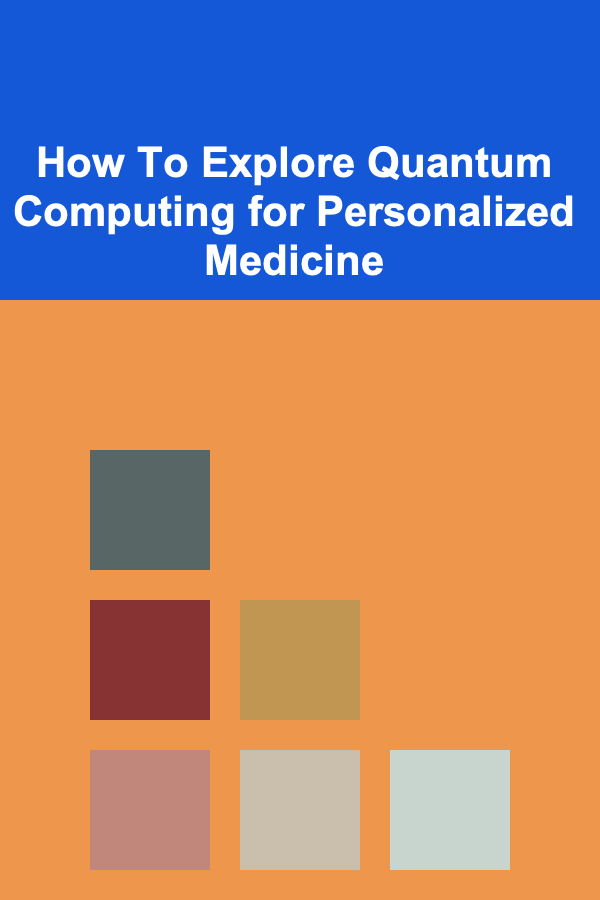
How To Explore Quantum Computing for Personalized Medicine
ebook include PDF & Audio bundle (Micro Guide)
$12.99$7.99
Limited Time Offer! Order within the next:

Quantum computing, once a futuristic concept, has rapidly emerged as one of the most transformative technologies of the 21st century. It promises to revolutionize fields like cryptography, artificial intelligence, and optimization problems, and now it is beginning to show potential for personalized medicine. Personalized medicine, which tailors medical treatment to the individual characteristics of each patient, aims to optimize healthcare outcomes by considering genetic, environmental, and lifestyle factors. However, the complexities of human biology, combined with the need for massive amounts of data processing, make it a challenging field.
This is where quantum computing could make a significant impact. Quantum computing leverages the principles of quantum mechanics, enabling the processing of information in ways that classical computers cannot match. It has the potential to solve problems intractable for classical systems, and this capability can be crucial in addressing the complexities of personalized medicine. In this article, we will explore the intersection of quantum computing and personalized medicine, discussing the fundamentals of quantum computing, how it can be applied in healthcare, and the challenges that lie ahead.
Understanding Quantum Computing
Before diving into its potential applications in personalized medicine, it's essential to understand the basics of quantum computing. At its core, quantum computing uses quantum mechanics to process information in fundamentally different ways from classical computers. In classical computing, information is processed in binary bits, which can be either 0 or 1. In quantum computing, however, quantum bits, or qubits, can exist in a superposition of states, meaning they can be 0, 1, or both simultaneously.
This property, known as superposition , allows quantum computers to explore many possibilities at once, making them incredibly powerful for certain types of problems. Additionally, qubits can be entangled, meaning the state of one qubit can be linked to the state of another, no matter the distance between them. This entanglement enables quantum computers to process vast amounts of data in parallel, further boosting their computational power.
There are other key concepts in quantum computing, such as quantum interference and quantum tunneling, which contribute to the power of quantum algorithms. Together, these properties allow quantum computers to solve problems much more efficiently than classical systems, especially in areas such as optimization, simulation, and cryptography.
The Promise of Quantum Computing in Personalized Medicine
Personalized medicine is at the intersection of genomics, data science, and patient care. It uses genetic information, lifestyle data, and environmental factors to create individualized treatment plans for patients. Traditional medical research involves analyzing large datasets and identifying trends that can inform clinical decision-making. However, as our understanding of genetics and biology advances, the amount of data that needs to be analyzed becomes overwhelming. In this context, quantum computing offers a transformative approach to solving some of the critical challenges in personalized medicine.
1. Accelerating Drug Discovery and Development
One of the most promising applications of quantum computing in personalized medicine is accelerating the drug discovery process. Traditional drug development involves testing millions of compounds to identify those that can be effective against specific diseases. This process is incredibly time-consuming and costly, often taking years or even decades to bring a drug to market. Furthermore, finding the right drug for the right patient can be a difficult task.
Quantum computing could revolutionize this process by simulating molecular interactions at an unprecedented scale and speed. Classical computers struggle to model the interactions of large molecules because of the complexity of quantum mechanics. However, quantum computers can model these interactions more accurately and faster, enabling researchers to identify potential drug candidates much more efficiently. Additionally, quantum simulations can help predict how drugs will interact with specific genetic profiles, improving the ability to personalize medicine for individual patients.
2. Genomic Data Analysis
The human genome is incredibly complex, with over 3 billion base pairs of DNA in every human cell. This vast amount of data is difficult to analyze using classical computing methods. While traditional computers have made significant progress in genomic sequencing and analysis, quantum computing has the potential to take genomic research to new heights.
Quantum computing can be used to solve complex problems in genetic sequencing, such as protein folding and mutation analysis. These problems are computationally expensive and time-consuming on classical systems. By utilizing quantum algorithms, researchers could analyze genomic data much more efficiently, leading to a deeper understanding of genetic diseases and how to treat them. This could also lead to the development of targeted therapies that are customized to a patient's genetic makeup, significantly improving outcomes.
3. Personalized Treatment Optimization
Quantum computing could also help optimize personalized treatment plans by processing vast amounts of data more quickly and accurately than classical computers. For example, healthcare providers need to consider genetic data, medical histories, environmental factors, and lifestyle choices when prescribing treatments. Quantum algorithms could analyze all of this data simultaneously, identifying the most effective treatment plan for an individual patient.
Furthermore, quantum computing could improve predictive modeling in medicine. By analyzing large datasets of medical records, clinical trials, and patient outcomes, quantum computers could help predict how a patient will respond to a particular treatment. This would allow for better decision-making, minimizing trial-and-error approaches in medical care.
4. Machine Learning and AI in Medicine
Machine learning and artificial intelligence (AI) are already being used in personalized medicine for tasks such as image analysis, diagnostic assistance, and treatment planning. Quantum computing could enhance these AI models by enabling them to process much larger datasets and perform more complex calculations. Quantum machine learning algorithms could enable better pattern recognition and anomaly detection, allowing for more accurate diagnoses and personalized treatment recommendations.
Quantum-enhanced AI could also improve the efficiency of clinical trials by identifying the most promising drug candidates and the most suitable patient populations for those drugs. This could reduce the time and cost associated with clinical trials, which is one of the major bottlenecks in the drug development process.
The Challenges in Applying Quantum Computing to Medicine
While the potential benefits of quantum computing in personalized medicine are vast, there are several challenges that need to be addressed before quantum technologies can be widely adopted in healthcare.
1. Quantum Hardware Limitations
One of the biggest challenges facing the development of quantum computing is the limitations of current quantum hardware. Most quantum computers today are still in the early stages of development, and many of them are not yet capable of solving practical problems. Quantum computers are highly sensitive to environmental noise and interference, which can cause errors in calculations. Developing stable and scalable quantum hardware is a significant hurdle that researchers are working to overcome.
2. Quantum Software Development
Quantum computing requires new algorithms and programming languages that can take advantage of the unique properties of qubits. Developing these algorithms is a complex task, as quantum algorithms are fundamentally different from classical algorithms. Researchers in quantum computing are still in the process of developing software tools that can be used in real-world applications, such as personalized medicine.
In addition to algorithm development, there is a need for robust error-correction methods to ensure that quantum calculations are accurate. Quantum computers are highly prone to errors due to the fragile nature of quantum states, and developing effective error-correction techniques is essential for reliable quantum computations in healthcare.
3. Integration with Existing Healthcare Systems
Another challenge in applying quantum computing to personalized medicine is integrating quantum technologies with existing healthcare infrastructure. Healthcare systems are complex and involve numerous stakeholders, including patients, doctors, hospitals, insurance companies, and regulatory bodies. Quantum computing technologies need to be integrated seamlessly into these systems without disrupting existing workflows or creating new bottlenecks.
Additionally, the adoption of quantum computing in healthcare will require specialized knowledge and training. Healthcare professionals, data scientists, and quantum researchers will need to collaborate to ensure that quantum tools are used effectively in personalized medicine.
4. Ethical and Privacy Concerns
The use of quantum computing in personalized medicine raises several ethical and privacy concerns. Genomic data is highly sensitive, and there are concerns about how this data will be protected, especially as quantum computers have the potential to break current encryption methods. If quantum computing enables faster genomic data analysis, it could lead to the creation of more comprehensive genetic databases, raising concerns about data privacy and security.
Furthermore, the use of AI and quantum computing to personalize treatment plans may raise ethical questions about the fairness and accessibility of these treatments. As quantum technologies become more advanced, it will be essential to ensure that they are used in ways that benefit all patients and do not exacerbate existing inequalities in healthcare.
Conclusion
Quantum computing holds immense potential for transforming personalized medicine, offering the ability to accelerate drug discovery, enhance genomic data analysis, optimize treatment plans, and improve AI models. However, there are significant challenges that need to be overcome before quantum computing can be widely applied in healthcare. From hardware limitations to ethical concerns, researchers, healthcare professionals, and policymakers must work together to ensure that quantum technologies are developed and implemented in a way that benefits patients and the healthcare industry as a whole.
The intersection of quantum computing and personalized medicine is still in its early stages, but the progress made so far suggests that we are on the cusp of a new era in healthcare. By harnessing the power of quantum computing, we could unlock new insights into human biology, leading to more effective and personalized treatments that improve the health and well-being of patients worldwide.

How to Build Passive Income by Creating Deep Learning Courses
Read More
How to Create a Themed Family Night to Bond Over Dinner
Read More
How to Save on Home Cleaning Supplies and Services
Read More
How to Set Up a Family Fitness Challenge at Home
Read More
How to Stage a Home with Small Budget-Friendly Updates
Read More
How To Utilize CRM Systems for Small Business
Read MoreOther Products

How to Build Passive Income by Creating Deep Learning Courses
Read More
How to Create a Themed Family Night to Bond Over Dinner
Read More
How to Save on Home Cleaning Supplies and Services
Read More
How to Set Up a Family Fitness Challenge at Home
Read More
How to Stage a Home with Small Budget-Friendly Updates
Read More